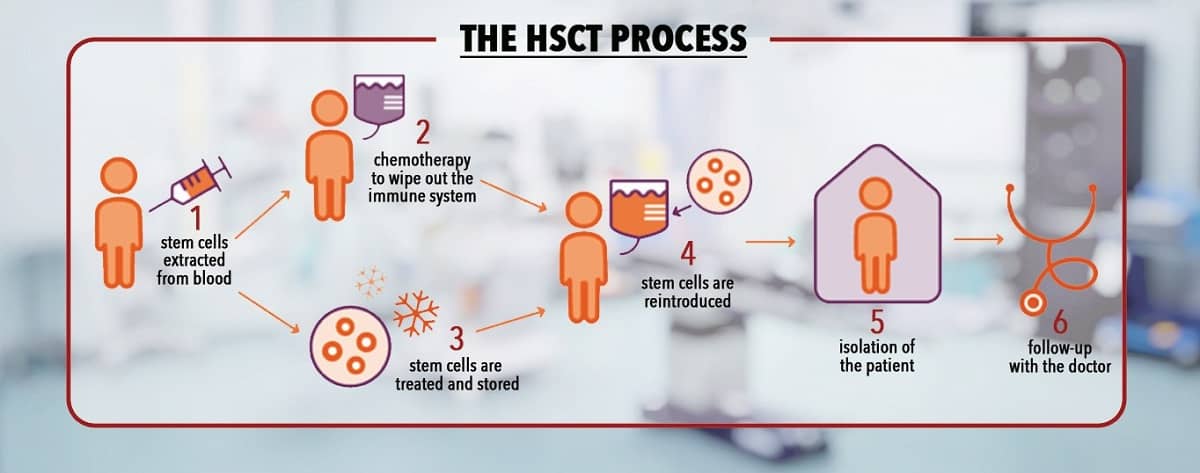HSCT Treatment for MS and other Auto Immune Conditions – Does it really work ?

Multiple sclerosis (MS), a perplexing and progressive neurological condition, wreaks havoc on the brain, spinal cord, and optic nerves. Its symptoms can range from manageable to devastating, and to date, no cure exists. But, there is a glimmer of hope in the form of a new treatment option, Hematopoietic Stem Cell Transplantation (HSCT).
Although HSCT is making waves for its potential to stop the progression of MS, it’s crucial to comprehend the pros, cons, and outcomes before making a decision. So, let’s delve into the mysteries of HSCT for MS and find out if it truly works or not.
The Science Behind HSCT

Thirty-five years ago, Dr. Richard Burt began a journey to treat chronic autoimmune diseases as they’d never been treated before. Using a treatment originally developed for leukemia but modified to be more gentle—a one-time combination of immune targetingdrugs followed by a transplant of the patient’s blood stem cells—he has documented the successful and often dramatic reversal of multiple sclerosis, systemic sclerosis (scleroderma), chronic inflammatory demyelinating polyradiculoneuropathy (CIPD), neuromyelitis optica, and Crohn’s disease HSCT is a radical treatment that involves destroying the immune system through high- dose chemotherapy or radiotherapy and then infusing new immune-forming stem cells.
This treatment is only indicated for specific conditions, including the most severe types of MS. The objective of HSCT is to halt the progression of MS by controlling the disease- causing inflammatory response of the immune system. Ideally, the new immune system created by the infused stem cells would have no memory of MS-caused autoimmune response and would therefore remain tolerant of the body, avoiding another immune attack.
Potential Rewards of HSCT
HSCT has the potential to bring numerous benefits to MS patients. It has the ability to stop MS progression, reduce or eliminate symptoms, and prevent the immune system from attacking the central nervous system, optic nerves, or brain. If an HSCT treatment is successful, it could be a lifelong treatment, targeting the root cause of MS – the immune system. Although HSCT wouldn’t cure the immune system, it would suppress it enough to prevent it from attacking the central nervous system, optic nerves, and/or brain.
Patient Experiences with HSCT
It’s difficult to determine the long-term effectiveness of HSCT for MS since the treatment is relatively new and has only shown promise in clinical trials. But, there have been a a good number of HSCT cases in the news, and patient forums like https://www.facebook.com/hsctindia that have provided patients with an opportunity to share their experiences. Some patients with aggressive forms of MS who underwent HSCT reported immediate results after the procedure, including the cessation of progression of the disease, regained mobility, and reduced or eliminated dependence on other treatments. Other patients with moderate forms of MS who underwent HSCT reported that the procedure brought the disease into remission, reducing or eliminating dependence on other treatments and regaining mobility and function.
The Cost of HSCT: A Burst of Reality
One of the crucial aspects to understand about HSCT is its cost and the fact that it’s not covered by insurance. HSCT is an extremely expensive treatment that can cost tens of thousands of dollars out-of-pocket. The exact cost of HSCT will vary based on the individual, insurance coverage, and chosen doctor. HSCT is only performed at specialized centres with 30 days stay in isolated hospital rooms equipped with HEPA Filter with Triple Level Air Filtration to avoid any risk of infection, 24 x 7 nursing care and best medical attention. Popular centres in Mexico and Russia cost more than 100,000 US Dollars for HSCT, while in India the cost is much reasonable at about 30,000 US Dollars with comparable facilities. For more details https://hsctindia.com/hsct-treatment-package/
Making an Informed Decision about HSCT
Before making a decision about HSCT for MS, you must consider the following:
-
- The current state of your MS
- Available treatment options and potential outcomes
- The science behind HSCT treatment
- Potential risks of undergoing HSCT
- The cost of the treatment
- Availability of a support system
Once you have all the facts, you’ll be equipped to make an informed decision about your
health and future.
The outcomes of HSCT as of now has helped thousands of patients with autoimmune
diseases has no doubt proven it to be a revolutionary approach that could convert their
life sentence into a one-time reversible illness.




